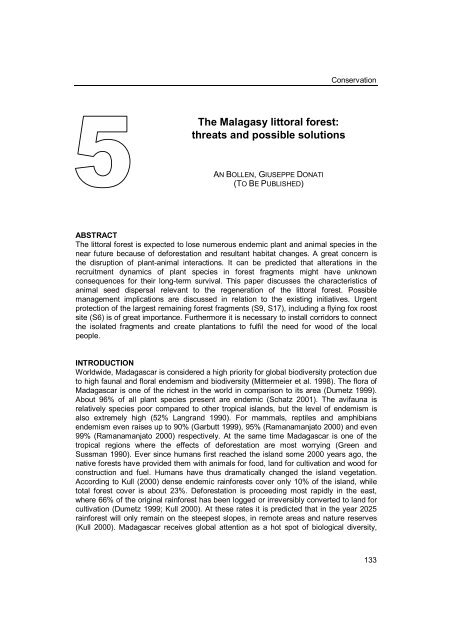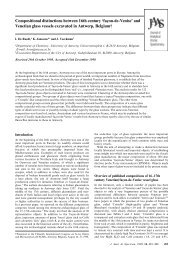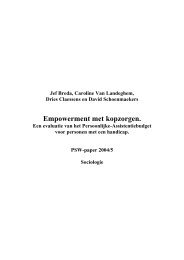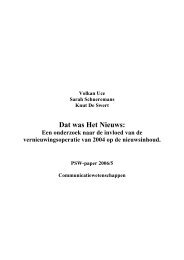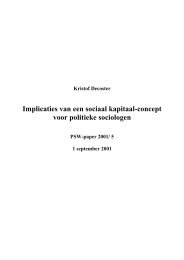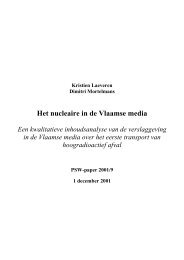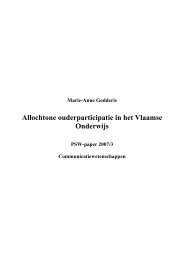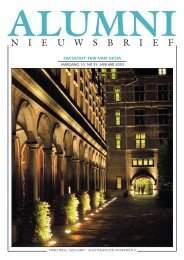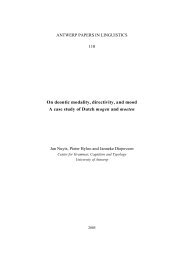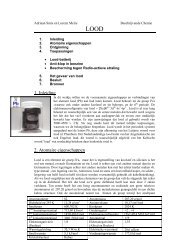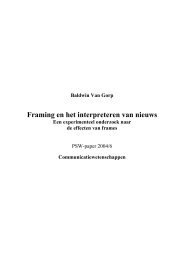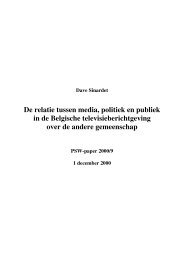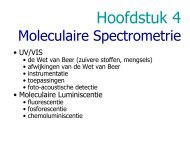Fruit-frugivore interactions in a Malagasy littoral forest - Universiteit ...
Fruit-frugivore interactions in a Malagasy littoral forest - Universiteit ...
Fruit-frugivore interactions in a Malagasy littoral forest - Universiteit ...
You also want an ePaper? Increase the reach of your titles
YUMPU automatically turns print PDFs into web optimized ePapers that Google loves.
The <strong>Malagasy</strong> <strong>littoral</strong> <strong>forest</strong>:<br />
threats and possible solutions<br />
AN BOLLEN, GIUSEPPE DONATI<br />
(TO BE PUBLISHED)<br />
Conservation<br />
ABSTRACT<br />
The <strong>littoral</strong> <strong>forest</strong> is expected to lose numerous endemic plant and animal species <strong>in</strong> the<br />
near future because of de<strong>forest</strong>ation and resultant habitat changes. A great concern is<br />
the disruption of plant-animal <strong><strong>in</strong>teractions</strong>. It can be predicted that alterations <strong>in</strong> the<br />
recruitment dynamics of plant species <strong>in</strong> <strong>forest</strong> fragments might have unknown<br />
consequences for their long-term survival. This paper discusses the characteristics of<br />
animal seed dispersal relevant to the regeneration of the <strong>littoral</strong> <strong>forest</strong>. Possible<br />
management implications are discussed <strong>in</strong> relation to the exist<strong>in</strong>g <strong>in</strong>itiatives. Urgent<br />
protection of the largest rema<strong>in</strong><strong>in</strong>g <strong>forest</strong> fragments (S9, S17), <strong>in</strong>clud<strong>in</strong>g a fly<strong>in</strong>g fox roost<br />
site (S6) is of great importance. Furthermore it is necessary to <strong>in</strong>stall corridors to connect<br />
the isolated fragments and create plantations to fulfil the need for wood of the local<br />
people.<br />
INTRODUCTION<br />
Worldwide, Madagascar is considered a high priority for global biodiversity protection due<br />
to high faunal and floral endemism and biodiversity (Mittermeier et al. 1998). The flora of<br />
Madagascar is one of the richest <strong>in</strong> the world <strong>in</strong> comparison to its area (Dumetz 1999).<br />
About 96% of all plant species present are endemic (Schatz 2001). The avifauna is<br />
relatively species poor compared to other tropical islands, but the level of endemism is<br />
also extremely high (52% Langrand 1990). For mammals, reptiles and amphibians<br />
endemism even raises up to 90% (Garbutt 1999), 95% (Ramanamanjato 2000) and even<br />
99% (Ramanamanjato 2000) respectively. At the same time Madagascar is one of the<br />
tropical regions where the effects of de<strong>forest</strong>ation are most worry<strong>in</strong>g (Green and<br />
Sussman 1990). Ever s<strong>in</strong>ce humans first reached the island some 2000 years ago, the<br />
native <strong>forest</strong>s have provided them with animals for food, land for cultivation and wood for<br />
construction and fuel. Humans have thus dramatically changed the island vegetation.<br />
Accord<strong>in</strong>g to Kull (2000) dense endemic ra<strong>in</strong><strong>forest</strong>s cover only 10% of the island, while<br />
total <strong>forest</strong> cover is about 23%. De<strong>forest</strong>ation is proceed<strong>in</strong>g most rapidly <strong>in</strong> the east,<br />
where 66% of the orig<strong>in</strong>al ra<strong>in</strong><strong>forest</strong> has been logged or irreversibly converted to land for<br />
cultivation (Dumetz 1999; Kull 2000). At these rates it is predicted that <strong>in</strong> the year 2025<br />
ra<strong>in</strong><strong>forest</strong> will only rema<strong>in</strong> on the steepest slopes, <strong>in</strong> remote areas and nature reserves<br />
(Kull 2000). Madagascar receives global attention as a hot spot of biological diversity,<br />
133


